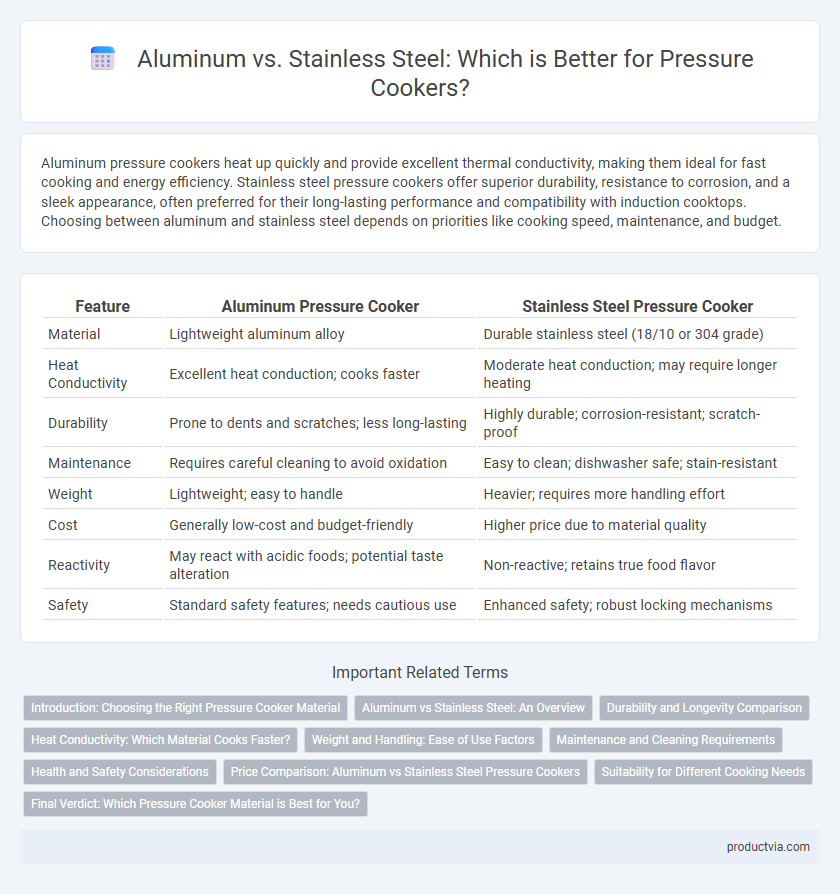Aluminum pressure cookers heat up quickly and provide excellent thermal conductivity, making them ideal for fast cooking and energy efficiency. Stainless steel pressure cookers offer superior durability, resistance to corrosion, and a sleek appearance, often preferred for their long-lasting performance and compatibility with induction cooktops. Choosing between aluminum and stainless steel depends on priorities like cooking speed, maintenance, and budget.
Table of Comparison
| Feature | Aluminum Pressure Cooker | Stainless Steel Pressure Cooker |
|---|---|---|
| Material | Lightweight aluminum alloy | Durable stainless steel (18/10 or 304 grade) |
| Heat Conductivity | Excellent heat conduction; cooks faster | Moderate heat conduction; may require longer heating |
| Durability | Prone to dents and scratches; less long-lasting | Highly durable; corrosion-resistant; scratch-proof |
| Maintenance | Requires careful cleaning to avoid oxidation | Easy to clean; dishwasher safe; stain-resistant |
| Weight | Lightweight; easy to handle | Heavier; requires more handling effort |
| Cost | Generally low-cost and budget-friendly | Higher price due to material quality |
| Reactivity | May react with acidic foods; potential taste alteration | Non-reactive; retains true food flavor |
| Safety | Standard safety features; needs cautious use | Enhanced safety; robust locking mechanisms |
Introduction: Choosing the Right Pressure Cooker Material
Aluminum pressure cookers offer excellent heat conductivity, ensuring faster cooking times and even heat distribution, making them ideal for energy-efficient kitchens. Stainless steel pressure cookers provide superior durability, resistance to corrosion, and a sleek, modern appearance, suitable for heavy-duty use and longevity. Selecting the right material depends on balancing heat performance with maintenance preferences and cookware lifespan.
Aluminum vs Stainless Steel: An Overview
Aluminum pressure cookers offer rapid heat conduction, making them energy-efficient and ideal for quick cooking. Stainless steel models provide superior durability, corrosion resistance, and maintain food flavor without reacting to acidic ingredients. Choosing between aluminum and stainless steel depends on priorities like heat conductivity versus long-term resilience and maintenance.
Durability and Longevity Comparison
Stainless steel pressure cookers offer superior durability compared to aluminum due to their resistance to corrosion, scratches, and warping, ensuring a longer lifespan even under frequent use. Aluminum pressure cookers are lightweight and heat up quickly but tend to degrade faster, showing signs of wear such as discoloration and denting over time. Choosing stainless steel guarantees sustained performance and longevity, making it a preferred material for pressure cookers intended for long-term use.
Heat Conductivity: Which Material Cooks Faster?
Aluminum pressure cookers offer superior heat conductivity, allowing them to heat up quickly and cook food faster due to their excellent thermal transfer properties. Stainless steel, while more durable and resistant to corrosion, has lower heat conductivity, resulting in slower and less even cooking compared to aluminum. Choosing aluminum enhances cooking efficiency, whereas stainless steel prioritizes longevity but may require more time to reach optimal cooking temperatures.
Weight and Handling: Ease of Use Factors
Aluminum pressure cookers are significantly lighter than stainless steel models, making them easier to handle and ideal for frequent use or carrying during travel. Stainless steel pressure cookers offer greater durability but tend to be heavier, which can affect ease of maneuverability and handling, especially in a busy kitchen environment. Choosing between aluminum and stainless steel depends on whether lightweight convenience or robust construction is prioritized for user comfort and efficiency.
Maintenance and Cleaning Requirements
Aluminum pressure cookers require frequent polishing to prevent discoloration and can develop a dull surface over time, making regular maintenance essential for optimal performance. Stainless steel models offer superior resistance to stains and corrosion, allowing for easier cleaning and less frequent upkeep. Both materials benefit from descaling and thorough drying to ensure longevity, but stainless steel's durability typically leads to a lower overall maintenance effort.
Health and Safety Considerations
Aluminum pressure cookers are lightweight and conduct heat quickly but may react with acidic foods, potentially causing aluminum leaching that raises health concerns. Stainless steel pressure cookers are non-reactive, corrosion-resistant, and safer for long-term use with all types of ingredients, minimizing the risk of metal contamination. For optimal health and safety, choosing high-quality stainless steel pressure cookers with food-grade certification ensures durability and non-toxicity during cooking.
Price Comparison: Aluminum vs Stainless Steel Pressure Cookers
Aluminum pressure cookers are generally more affordable than stainless steel models, offering cost-effective options for budget-conscious buyers. Stainless steel pressure cookers tend to have higher upfront prices due to their durability, corrosion resistance, and aesthetic appeal. The price difference reflects material quality and longevity, with aluminum being economical but less durable compared to the premium build of stainless steel pressure cookers.
Suitability for Different Cooking Needs
Aluminum pressure cookers excel in rapid heat conduction, making them ideal for quick cooking and energy efficiency, especially suited for everyday meal preparation. Stainless steel pressure cookers offer superior durability, resistance to corrosion, and maintain flavor integrity, making them preferable for slow-cooked dishes and acidic foods. Choosing between aluminum and stainless steel depends on whether fast cooking or long-term durability and versatility are the primary requirements.
Final Verdict: Which Pressure Cooker Material is Best for You?
Aluminum pressure cookers heat quickly and offer excellent thermal conductivity, making them ideal for fast cooking, but they may react with acidic foods and tend to be less durable. Stainless steel pressure cookers provide superior durability, resistance to corrosion, and compatibility with induction cooktops, though they heat more slowly and often come at a higher price point. Choosing between aluminum and stainless steel depends on your cooking habits, budget, and preference for maintenance versus longevity.
Aluminum vs Stainless steel for pressure cooker Infographic

 productvia.com
productvia.com